| | | OFFLINE | | Post: 26.164
Post: 8.656 | Registrato il: 28/08/2005
Registrato il: 20/01/2009 | Administratore | Utente Master | |
|


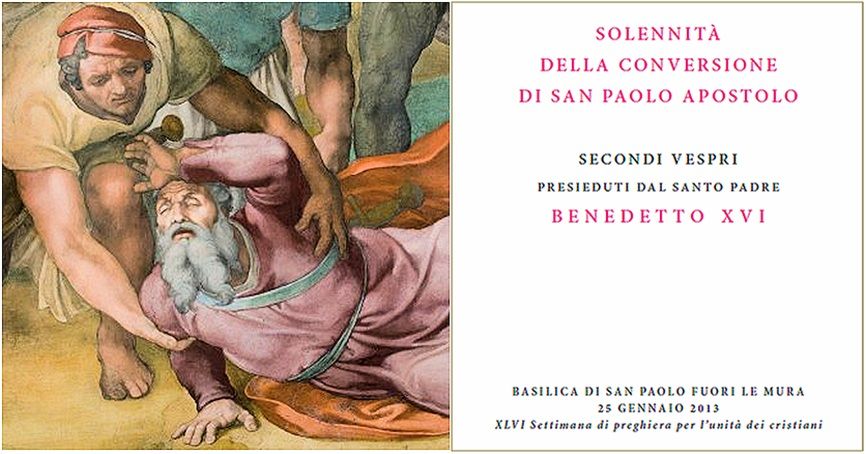 Libretto Cover: Michelangelo, Conversion of St. Paul (detail), 1584, Fresco, Cappella Paolina, Vatican Apostolic Palace.
Pope points to decreasing presence of
Libretto Cover: Michelangelo, Conversion of St. Paul (detail), 1584, Fresco, Cappella Paolina, Vatican Apostolic Palace.
Pope points to decreasing presence of
Christian message in contemporary life
Adapted from

January 25, 2013
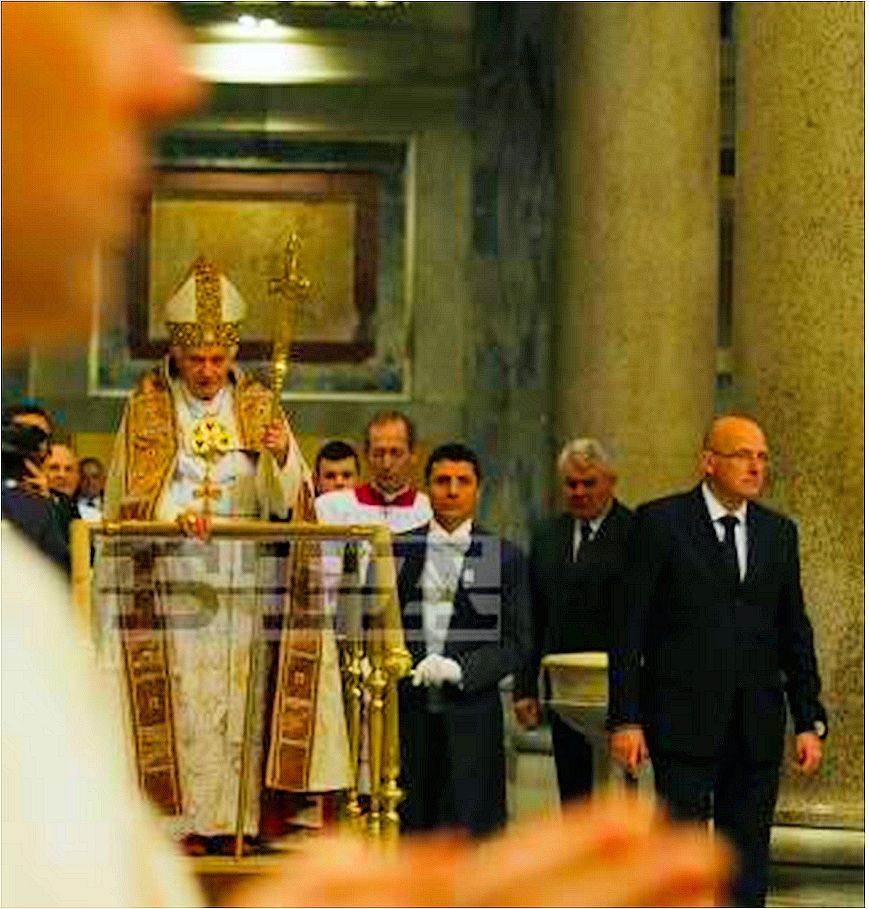
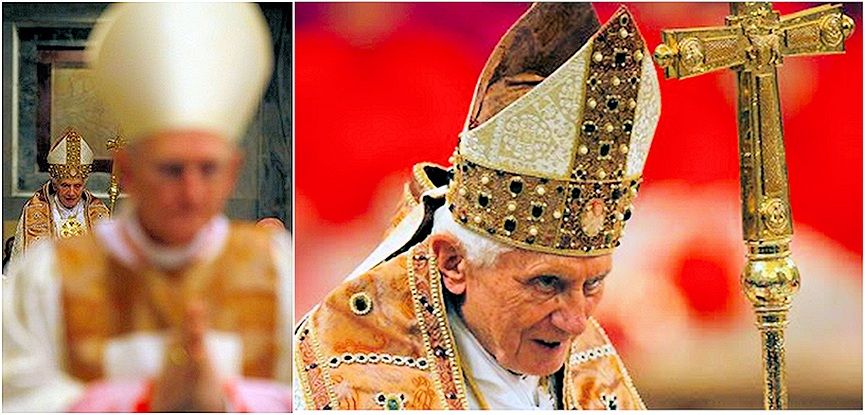 Left, foreground: Cardinal James Harvey in his first public appearance as Arch-Priest of St. Paul outside the Walls.
Left, foreground: Cardinal James Harvey in his first public appearance as Arch-Priest of St. Paul outside the Walls.
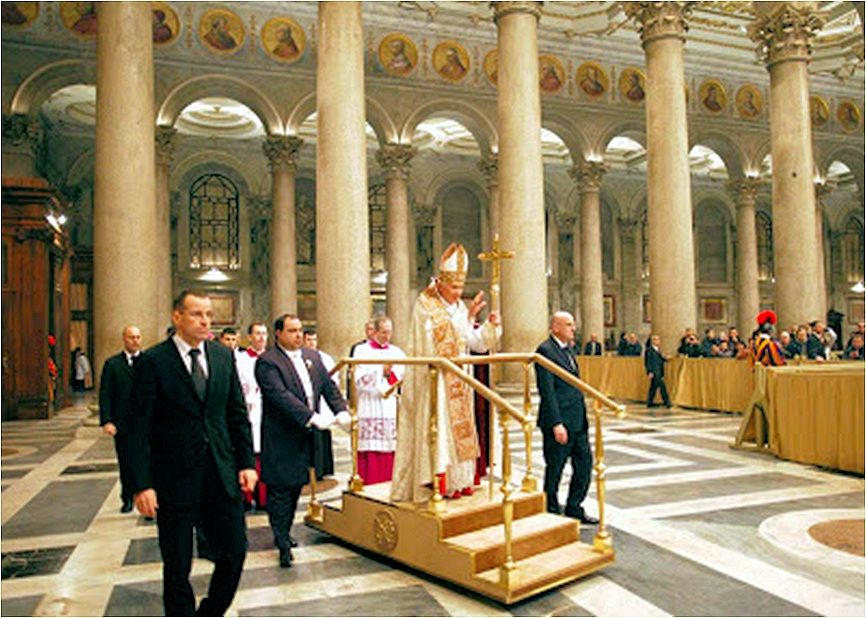
Pope Benedict XVI presided over an ecumenical Vespers service on Friday evening in the Basilica of St Paul outside the Walls. The liturgy marked the close of the Week of Prayer for Christian Unity.
The Christian churches have observed this week annually in prayer, dialog and actions aimed at bringing about their reunification since 1908 at the initiative of Fr. Paul Wattson, a Catholic convert and priest who founded the Franciscan Friars of the Atonement.
In his homily, the Holy Father pointed out that “In today's society, it seems that the Christian message is less and less a presence in personal and community life, and this is a challenge for all the Churches and Ecclesial Communities.”
He said Christian unity was almost a prerequisite for a more efficacious evangelization, whether with those who have never heard the Good News, or those who have lost touch with its healing and saving power.
He continued: "The scandal of division that undermines missionary activity was the impulse that began the ecumenical movement that we know today. The full and visible communion among Christians is to be understood, in fact, as a fundamental characteristic of ever clearer witness" in order to pass on the faith in the contemporary world and for a stronger presence in contemporary culture.
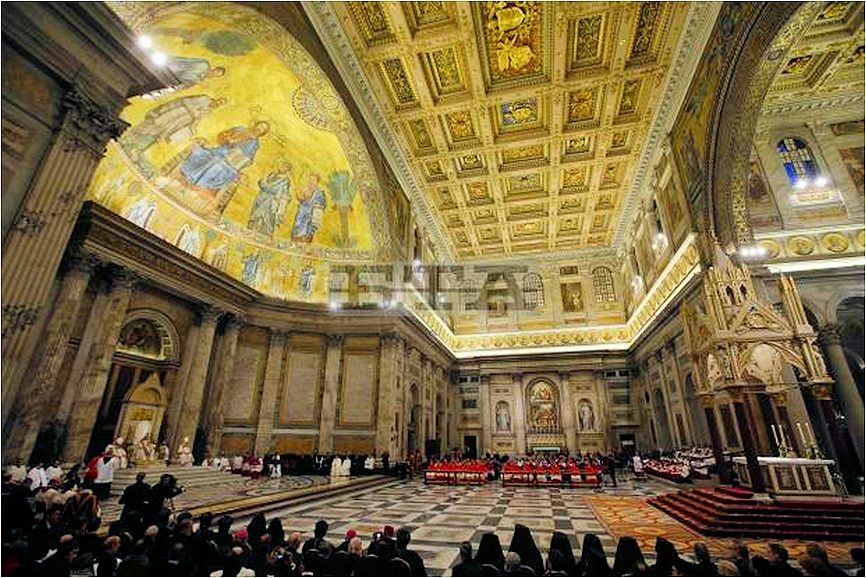
Here is a translation of the Holy Father's homily:
Dear brothers and sisters{
It is always a joy and a special grace to find ourselves together at the tomb of the Apostle Paul to conclude the Week of Prayer for Christian Unity.
I affectionately greet all the cardinals present, starting with Cardinal Harvey, Arch-Priest of this Basilica, and with him, the abbot and community of [Benedictine] monks who are our hosts.
I greet Cardinal Koch, president of the Pontifical Council for Promoting Christian Unity and all those who work in his dicastery.
I address my heartfelt and fraternal greetings to His Eminence Metropolitan Gennadios, representing the Ecumenical Patriarch; the Reverend Canon Richardson, personal representative in Rome of the Archbishop of Canterbury; and to all the representatives of the various Churches and ecclesial communities who are gathered here this evening.
Moreover, I am particularly pleased to greet the members of the Mixed Commission for Theological Dialog between the Catholic Church and the Oriental Orthodox Churches, for whom I wish fruitful work during the plenary session that is taking place these days in Rome' as well as the students of the Ecumenical Institute of Bossey who are visiting Rome to deepen their knowledge about the Catholic Church; and the young Oriental Orthodox men and women who are students in Rome.
Finally, I greet every one present who are here to pray for unity among all the disciples of Christ.
This celebration takes place during the Year of Faith, which began last October 11, on the 50th anniversary of the opening of the Second Vatican Council.
Communion in the same faith is the basis for ecumenism. Indeed, unity is given by God as something inseparable from the faith. St. Paul expresses it very well: "One body and one Spirit, as you were also called to the one hope of your call; one Lord, one faith, one baptism; one God and Father of all, who is over all and through all and in all" (Eph 4,4-6).
The profession of faith at baptism in God, Father and Creator, who revealed himself in his Son Jesus Christ, and pouring out the Spirit who vivifies and sanctifies, already unifies Christians.
Without faith - which is primarily a gift of God, but also man's response to that gift - the entire ecumenical movement would be reduced to some sort of 'contract' to which all must adhere for the common interest.
The Second Vatican Council reminds us that "the more effort they make to live holier lives according to the Gospel, the better will they further Christian unity and put it into practice. For the closer their union with the Father, the Word, and the Spirit, the more deeply and easily will they be able to grow in mutual brotherly love"
(Decr. Unitatis redintegratio, 7).
The doctrinal questions that still divide us should not be ignored or minimized. Rather they must be faced with courage, in a spirit of brotherhood and reciprocal respect.
Dialog, when it reflects the priority of the faith, allows us to open ourselves to the action of God with the first trust that by ourselves, we cannot construct unity, but that it is the Holy Spirit who will lead us to full communion and allow us to avail of the spiritual richness present in the various churches and ecclesial communities.
In the present society, it seems that the Christian message has a progressively decreasing effect on personal and community life, and this represents a challenge for all the Churches and ecclesial communities.
Unity itself is a preferential means - almost a prerequisite - for announcing the faith in an increasingly credible way to those who do not yet know about the Savior, or who, despite having nreceived the Gospel announcement, have almost forgotten this precious gift.
The scandal of division that undermined missionary activity was the impulse that started the ecumenical movement as we know it now. Full and visible unity among Christians must be understood, indeed, as a fundamental characteristic for a clearer witness to Christ.
While we are still on the road to full unity, it is therefore necessary to pursue concrete collaboration among all the disciples of Christ ion order to transmit the faith to the contemporary world.
Today there is great need for reconciliation, dialog and reciprocal understanding, in a non-moralistic perspective, but in the name of Christian authenticity, in order to have a more incisive presence in the reality of our time. Thus, true faith in God is inseparable from personal holiness, as it also is in the search for justice.
In the Week of Prayer for Christian Unity that ends today, the theme that was offered for our meditation was "What does the Lord require of us?", inspired by the words of the prophet Micah (cfr 6,6-8). This was proposed by the Student Christian Movement of Indian, along with the All-India Catholic University Federation and the National Council of Churches in India, who also prepared the aids for reflection and prayer.
I wish to express my sincere thanks to all who worked together on this, and with great affection, I assure them of my prayers for all the Christians of India who have often been called on to bear witness to their faith in difficult conditions.
"To walk humbly with God" (cfr Mi 6,8) means above all to walk in the radicality of faith, like Abraham, trusting in God, placing in him our hope and aspiration, but it also means going beyond barriers, beyond hatred, racism, and social and religious discrimination which divides and damages all of society.
As St. Paul says, Christians should be the first to offer a luminous example in the search for reconciliation and communion in Christ that can overcome every kind of division. In the Letter to the Galatians, the Apostle of the Gentiles says: "All of you who were baptized into Christ have clothed yourselves with Christ. There is neither Jew nor Greek, there is neither slave nor free person, there is not male and female; for you are all one in Christ Jesus" (3,2-28).
Finally, our quest for unity in truth and in love must never lose sight of the perception that Christian unity is the work and gift of the Holy Spirit, one that goes well beyond our efforts. That is why spiritual ecumenism, especially prayer, is the heart of the ecumenical effort (cfr Decr. Unitatis redintegratio, 8).
Nonetheless, ecumenism will not bear lasting fruit is it is not accompanied by concrete gestures of conversion that move consciences and promote the healing of memories and of relationships.
As the Vatican II decree on ecumenism says, "There can be no ecumenism worthy of the name without a change of heart" [conversion] (No. 7). An authentic conversion, such as the prophet Micah suggested, and of whom the Apostle Paul is a significant example, will bring us closer to God, who is the center of our life, in order to bring us closer as well to each other.
This is a fundamental element of our ecumenical commitment. The renewal of the interior life in our hearts and minds, which must be reflected in our daily life, is crucial for every dialog and path of reconciliation, thus making ecumenism a reciprocal commitment of understanding, respect and love, "so that the world may believe" (Jn 17,21).
Dear brothers and sisters, let us invoke the Virgin Mary, unparalleled model of evangelization, so that the Church, "sign and instrument of intimate union with God and the unity of all mankind" (Lumen gentium, 1)., may announce Christ the Savior with directness, even in our time. Amen.
[Modificato da TERESA BENEDETTA 26/01/2013 22:32] |